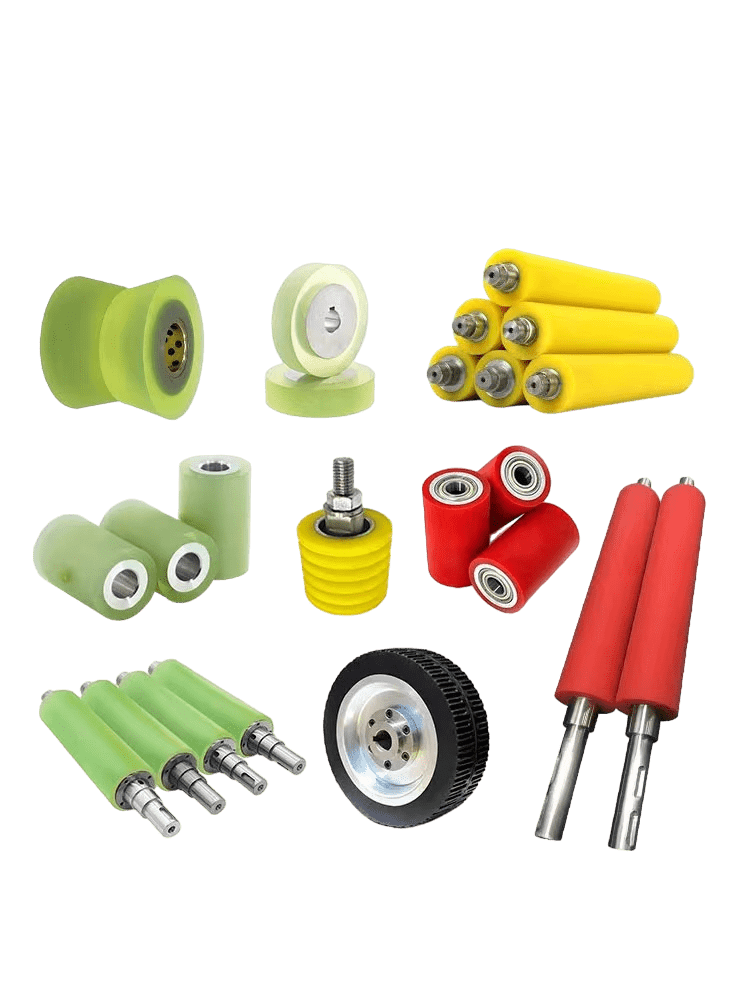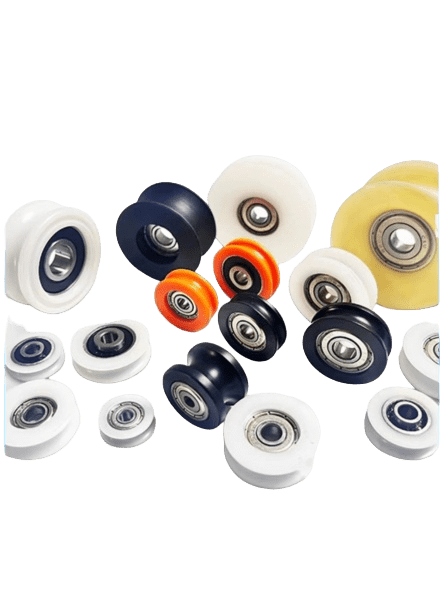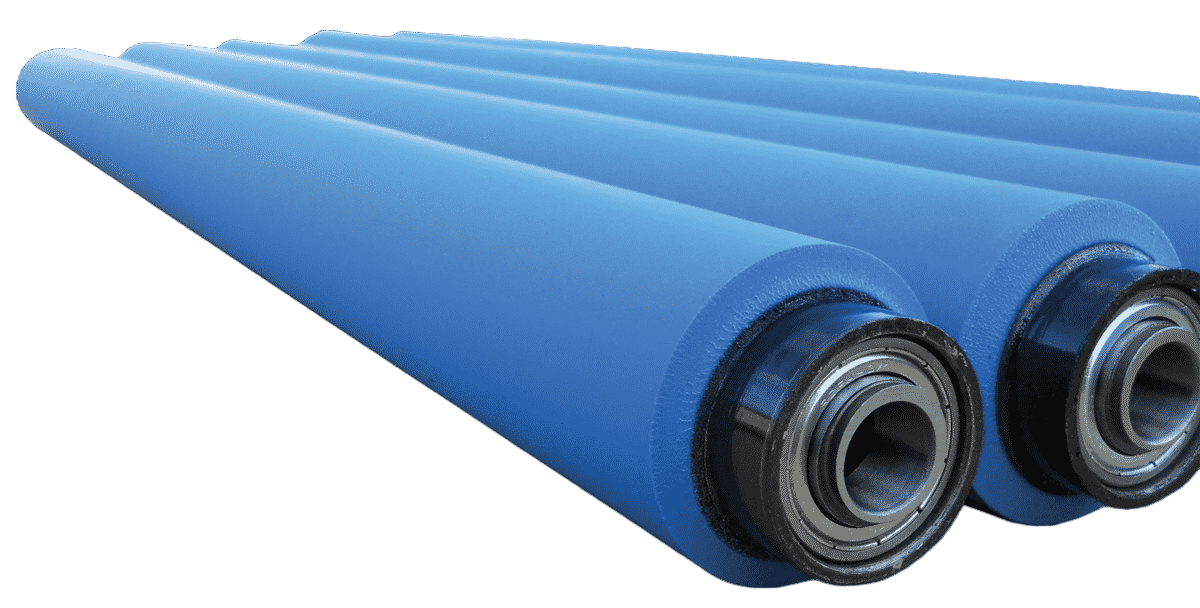7 Key Advantages of Polyurethane Rollers Over Rubber Rollers
In industrial settings, rollers are key to keeping machinery and processes running smoothly. Polythane and rubber are the top materials used for conveyor rollers due to their distinct properties that make them suitable for various applications.
This blog will show why polyurethane rollers are usually preferred over rubber ones and why they're the top choice in many fields.

Understanding Polyurethane Rollers
What Are Polyurethane Rollers?
Polyurethane rollers are cylinder-shaped parts covered with polyurethane, a tough and flexible material. They're widely used in machines like conveyor systems and printing presses because they move smoothly, last a long time, and can handle heavy loads well. This makes them a popular choice for many industries that need reliable and efficient movement in their machinery.
Composition of Polyurethane Rollers
Polyurethane rollers consist of a core, usually made of metal or plastic, coated with a layer of polyurethane—a durable, rubber-like material. The thickness and hardness of the polyurethane layer can be adjusted to suit different uses, from soft and bendy to hard and stiff. This design allows them to absorb shocks, withstand wear, and carry heavy loads, making them perfect for many industrial uses.

Applications of Polyurethane Rollers
Polyurethane rolls are widely used in manufacturing process, printing, textile industry, food processing, and material handling due to their versatility and performance.
Understanding Rubber Rollers
What Are Rubber Rollers?
Rubber rollers are a classic type of cylindrical roller, crafted from either natural or man-made rubber materials.

Composition of Rubber Rollers
Rubber rollers are made from blends of rubber that might also contain carbon black, different fillers, and extra additives to boost their performance.
Applications of Rubber Rollers
Rubber rollers, while widely used, have certain limitations compared to polyurethane. They're great for their flexibility but may not be as tough or resistant to wear, heat, or chemicals. Polyurethane rollers shine in harsh conditions and can be better tailored for specific needs, making them a top choice for applications where rubber's unique benefits aren't essential.
Key Advantages of Polyurethane Rollers Over Rubber Rollers
Superior Durability
Polyurethane rollers are better than rubber ones because they are more durable with higher abrasion resistance. They are really useful in industries like mining, construction, and forestry, where the equipment has to deal with tough conditions. Polyurethane rollers also has a longer service life, which is great for automotive conveyors and assembly lines because it means they don't need to be maintained as often.
Higher Load-Bearing Capacity
Polyurethane rollers stand out because they can carry heavy loads without bending or warping, which gives them an advantage over rubber rollers. Their high tensile strength and flexibility ensure even stress distribution and a quick return to shape after being loaded.
Poly rollers are designed to handle more weight, making them ideal for material handling, manufacturing, mining, textiles, printing, and the pulp and paper industry. These fields need strong and dependable rollers.
The better performance of polyurethane rollers not only boosts how well operations run but also cuts down on maintenance costs and downtime. This shows the big advantage of using polyurethane rollers in demanding industrial settings.
Better Chemical Resistance
Compared to rubber, polyurethane handles better at handling common chemicals including:
- Solvents like methyl ethyl ketone (MEK), toluene, xylene, and acetone.
- Acids such as hydrochloric acid (HCl), sulfuric acid (H2SO4), and nitric acid (HNO3).
- Bases like sodium hydroxide (NaOH) and potassium hydroxide (KOH).
- Oils including mineral oil, cutting oil, and various industrial greases.
Polyurethane rollers are reliable and durable, keeping things running smoothly even when faced with harsh or abrasion chemicals. This makes them the go-to choice for industries that deal a lot with chemicals, such as chemical Processing, oil and gas industry, agriculture, pharmaceuticals, and metallurgy and metalworking.
Enhanced Performance in Harsh Environments
Polyurethane rollers are specially made to work well in tough places. These rollers can handle very cold temperatures down to -30°C and very hot temperatures up to 80°C. This means they are great for use in extreme temperatures. Because they are so strong, polyurethane rollers stay in good shape and work well even when they are in places with big changes in temperature or where there is a lot of humidity or rough materials.
In comparison, rubber rollers, whether they are made from natural or synthetic materials, can only work in a smaller temperature range. Natural rubber works best from -10°C to 60°C, while synthetic rubber like Neoprene can handle temperatures from -20°C to 70°C. This smaller range means that rubber rollers can break down more easily when they are in very hot or very cold places, which can make them work less well and not last as long. Also, rubber is not as strong as polyurethane when it comes to dealing with rough or tough conditions.
Polyurethane is a really strong and flexible material that's great for places where things can get tough, including chemical plants, cold storage, hot factories, and rough material work.
Reduced Noise and Vibration
Polyurethane rollers are made to be really quiet and reduce shaking. Their natural stretchiness and shock absorption help quiet down sounds and calm any jitters during use. This results in less noisy machines and a nicer environment for everyone around. Plus, polyurethane is great at softening blows, which makes equipment run more smoothly and quietly, reducing both shake and noise even more.
In comparison, rubber, while noise-absorbent, degrades faster so as to increase noise over time.
Therefore, in places where it's important to keep things quiet, like hospitals, offices, shops, and homes, polyurethane rollers are really important.
Lower Maintenance Requirements
Polyurethane rollers are low-maintenance compared to rubber rollers because they're tougher and can handle chemicals and rough situations better. This means they last longer and need fewer fixes and replacements. Rubber rollers, however, get damaged more easily and need more care.
Choosing polyurethane can save businesses a lot on the cost of new rollers and maintenance work. Also, spending less time on repairs means work can keep going smoothly.
In summary, polyurethane rollers save money and increase productivity, making them a smart, cost-saving option.
Table 1 Poly rollers vs Rubber Rollers: Maintenance Needs and Practices
|
Aspect |
Polyurethane Rollers |
Rubber Rollers |
|
Durability |
High, less frequent maintenance needed |
Moderate, more frequent maintenance needed |
|
Maintenance Frequency |
Less frequent |
More frequent |
|
Cost Savings |
Significant due to fewer replacements, less downtime, and lower repair costs |
Higher costs due to more frequent replacements and repairs |
|
Inspection |
Routine checks for wear or damage |
Frequent checks for cracks or swelling |
|
Cleaning |
Periodic debris removal |
Regular surface cleaning |
|
Chemical Resistance |
High, less chemical damage |
Moderate, check regularly for damage |
|
Regular lubrication of bearings |
Similar lubrication needs |
|
|
Surface Maintenance |
Consistent texture and hardness check |
Frequent resurfacing needed |
|
Repairs |
Rarely needed |
More frequent resurfacing and repairs |
Greater Versatility and Customization
Polyurethane is highly versatile, allowing for extensive customization options:
Table 2 Poly rollers vs Rubber Rollers : Versatility and Customization
|
Aspect |
Polyurethane Rollers |
Rubber Rollers |
|
Size |
Highly precise and wide range |
Customizable, but with less precision |
|
Hardness |
Broad range, from very soft to hard |
Limited range, less variation possible |
|
Color |
Extensive color customization |
Limited color options and durability |
|
Notable Applications |
Manufacturing process, Conveyor Systems, Printing, Automotive, Medical Devices |
General conveyance, basic manufacturing, less critical applications |
Conclusion
Polyurethane rollers outperform rubber rollers in industrial uses because they're more durable, can carry heavier loads, resist chemicals better, and handle tough conditions well. They need less upkeep, save money, and come in various sizes, levels of hardness, and colors. This makes them perfect for use in manufacturing, moving materials, the automotive field, and medical devices. Choose polyurethane rollers for high quality, improved efficiency, dependability, and long-lasting operation in your business. Their flexibility helps streamline your processes and cut down on downtime.
Keep Learning








